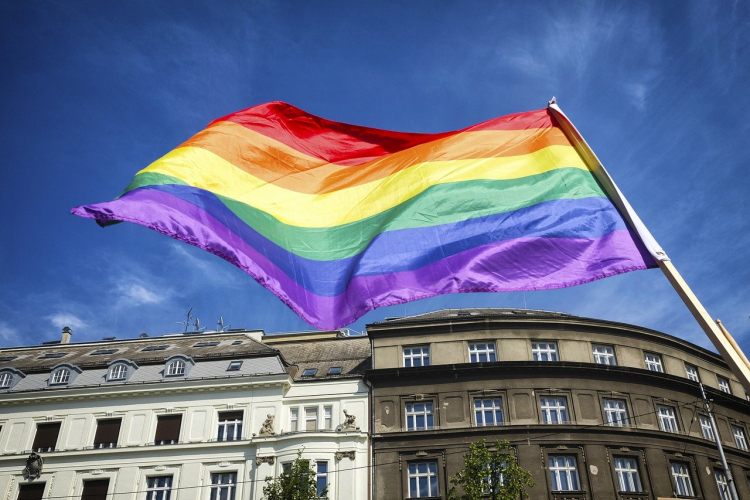Paris: City of Love, But for LGBTQ+ Youth?

🔉 Listen to this Article:
Audio edited by Gauthier Lemaire
Le Marais, known for its iconic rainbow colored crosswalks, has been popularized as not just any but the space for the LGBTQ+ community. For many AUP students like Andrea Vejar, a second-year student from Mexico, a concept such as this would be unheard of in her hometown. “My town is a very catholic community. I have friends who have to hide their sexuality from their parents for fear of being sent to conversion therapy.”
For others like Arianna Razavi, a second-year from California, and Gideon Vicini, a transfer from New Orleans, Louisiana, the existence of Le Marais is no shock to them having come from areas that are, if not more accepting of different sexualities. Razavi explains, “I live very close to the Bay Area so I am very used to the type of acceptance I see here in Paris.” As for Vicini, it is not that Paris is not accepting of all sexualities, for he has not witnessed any type of discrimination but compared to his hometown, the acceptance is less obvious.
In addition, Vicini feels that, “...besides the rainbow crosswalks, Le Marais would look like any other quartier to me.” Vicini's observations reveal how hard it can be to see how the area serves its LGBTQ+ inhabitants when statements like rainbow crosswalks become less of a symbol of inclusion and more of a tourist attraction. In this way, tourism has made Le Marais like any other famous Parisian quartier, subverting any attempts at cultivating an authentic LGBTQ+ space.
Gemini Miller, a third year from South Carolina, agrees that tourism has affected Le Marais. They explain, “Yeah, I mean it’s a cute area but...I don’t know if that is really the home of the queer community. They harbor a lot of queer communities but a lot of people go there for tourism. It’s kind of a touristic queer space. So it’s this weird mix of feeling seen but also is it really feeling seen or is it just marketed that way.”
It is easy to think when looking at Le Marais that the work towards inclusion has already been done, but this only feeds into the illusion Miller describes. In their experience, a lot of the gay bars, while open to everyone, were historically created for only gay men and are often still marketed in that way. As a result, there is a lack of spaces catered towards female-identifying LGBTQ+ youth.
Miller goes on to mention their own struggles towards being seen, stating, “There are emerging gender neutral pronouns in the French language but it’s not widely used so much as they, them in the United States. Generally, I ask French language users to use male pronouns because there is a lot of pushback in the French language to use gender neutral terms that they don’t even know about. It’s mainly only known and used in the queer communities.”
2011 Paris Pride Image Credit: Wikimedia CommonsIn other aspects of self-expression, students described Paris as being conservative. Amy Thorpe, a fourth-year student, realized, “Since coming to France, I noticed people tend to keep their self-expression of their sexuality more to themselves. I think people tend to conform more in Paris than in the US.” Obviously, the way you dress does not define your sexuality. However, there is an importance in being able to express your sexual identity just like any other part of your identity in a healthy and meaningful way. So the question then becomes: is Paris too conservative?
Ryan Lambright, a second-year student, believes that Paris has certain areas where it is harder to find people expressing their sexuality so openly. However, Lambright further adds, “Right after London, Paris is a close second in terms of places where I have felt the freest in expressing my sexuality through fashion.” The expression while not as overt compared to other cities, the existence of it is there.
On the contrary, the lack of overtness could be a sign that Paris has a long way to go in terms of LGBTQ+ acceptance. Adaeze Nwokolobia, a third-year student, has spoken to friends who feel that this is the one issue French people pretend to be open about but in reality, are not. Throughout my interviews, everyone mentioned how open Parisians are about sex but Nwokolobia feels that on the topic of varying sexualities, the openness ends there.
It is also important to note as Nwokolobia stated later on in our interview, Le Marais is one of the most expensive quartiers to live in Paris which excludes lower class members of the LGBTQ+ community. Le Marais is not only potentially limiting to who has access to these LGBTQ+ friendly spaces, but also who within the community gets to be represented and seen by not only other Parisians but the outside world.
Despite this reality, its existence says that there are efforts being made. Fortunately, Paris is a city of expatriates like myself and others at AUP. People like Miller or Razavi bring with them from their hometowns a unique worldview that can contribute to the city’s growing acceptance of the LGBTQ+ community.








